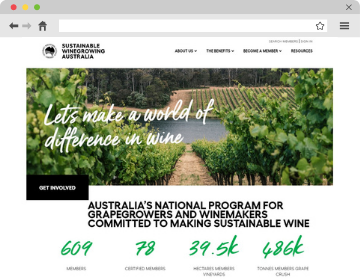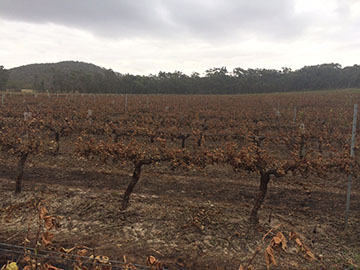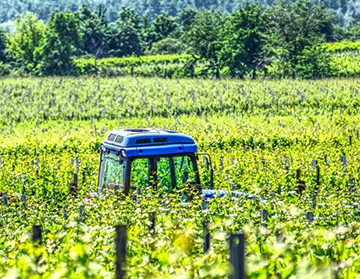Citizen science project empowers students to seek out new yeasts
Bushfire and smoke videos available
Brush up on your pruning skills
Sustainable Winegrowing Australia – now is a great time to join
Save the date – the 18th AWITC will be held in Adelaide, 26-29 June 2022
18th AWITC – call for workshop convenors
Register now for winter webinars
Order the latest staff publications online
Citizen science project empowers students to seek out new yeasts |
|
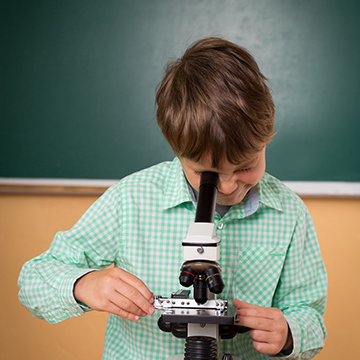 |
The AWRI was recently awarded a grant from the Australian Government under the Citizen Science Grants Round 2 Program. The funded project will engage school students to act as citizen scientists, isolating yeasts found in the Australian environment and contributing to a significant collection of yeast strains. With yeast and other fungi playing a key role in industries such as baking, brewing, pharmaceuticals and biofuels, this project has potential to contribute to future agricultural and food production and the transition to a bio-based economy. Students will also be introduced to real-world scientific research methods and gain an understanding of microbiological and molecular techniques. AWRI scientists are very excited to be involved in this project, both from the perspective of what it will reveal about distribution of yeasts across Australia and the opportunity to inspire future scientists. For more information about this project, contact Dr Anthony Borneman on 08 8313 6600 or anthony.borneman@awri.com.au. |
Bushfire and smoke videos availableNew videos have recently been added to the AWRI’s YouTube channel to assist wine producers with different aspects of managing smoke-affected fruit. These include a step-by step guide to conducting mini-ferments, a smoke sensory assessment procedure and an animation about why rigorous sensory evaluation is so important in cases of suspected smoke taint. Wine Australia has also recently uploaded all the presentations from the National Bushfire Conference held in May. If you missed Dr Mark’s Krstic’s national overview, Dr Mango Parker’s presentation on early-season smoke exposure, Damian Espinase Nandorfy’s discussion of smoke sensory evaluation or Dr Eric Wilkes’ presentation on smoke taint diagnostics, they are all now available, along with the rest of the excellent presentations delivered on the day. |
|
Brush up on your pruning skills |
|
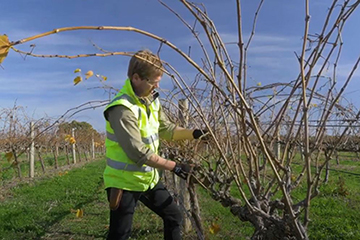 |
Last year the AWRI worked with Nick Dry from Foundation Viticulture to produce three demonstration videos on grapevine pruning. If you’d like to refresh your pruning skills this season or help guide novice pruners, check out these videos now: |
Sustainable Winegrowing Australia – now is a great time to joinFor vineyards and wineries that are not yet members of Sustainable Winegrowing Australia, now is a fantastic time to join the program, as it’s the time of the year when members collate and provide their sustainability data, leading to the availability of highly useful benchmarking reports in October and the compilation of regional and national reports. If you are interested in joining, sign up here to receive a short email series with tips to help you get started or join straight away here. In other sustainability news, the Sustainable Winegrowing Australia working group has been busy reviewing the program’s metrics and workbook to ensure the content is simple, best practice, practical to apply and nationally relevant. In addition, the workbook is now aligned with the vineyard and winery certification standards, which means that it can be used as an internal audit or ‘checklist’ of things to do when preparing for or maintaining certification. The Sustainable Winegrowing Australia trust mark is also starting to show up on wine labels – keep an eye out for it! Margan Family Winegrowers, Rymill Coonawarra and Yalumba Wine Company are some recent examples of members who are now displaying the trust mark on their wines. A selection of wines showing the trust mark were also recently part of a promotion for Sustainable Winegrowing Australia held in collaboration with Freshcare at the Hort Connections conference and exhibition in Brisbane. For more information about any aspect of Sustainable Winegrowing Australia, visit the new website or contact the AWRI helpdesk on helpdesk@awri.com.au or 08 8 313 6600. |
|
Save the date – the 18th AWITC will be held in Adelaide, 26-29 June 2022 |
|
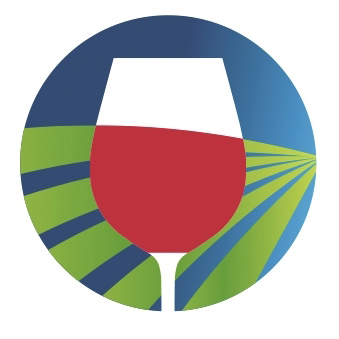 |
It’s hard to believe, but it’s now less than a year until the Australian Wine Industry Technical Conference returns to Adelaide! Next year’s program will feature Outlook sessions, plenary presentations, hands-on workshops, Fresh Science, an extensive poster exhibition and the popular student forum ‘In the wine light’. The conference will be staged side-by-side with the extensive WineTech trade exhibition, delivered in partnership with Expertise Events and WISA. There is also a strong social element to the conference, with plenty of opportunities for networking. Make sure the dates of 26–29 June 2022 are locked in your diary, as you won’t want to miss the Australian wine industry’s biggest technical event. For more information visit the AWITC website or contact the Conference Manager, Kate Beames on kate.beames@awitc.com.au. |
18th AWITC – call for workshop convenorsp>The Australian Wine Industry Conference is seeking expressions of interest to convene workshops at the 18th AWITC in Adelaide in June 2022. Approximately 30 workshops will be staged, covering a range of themes, across three 2.5-hour sessions on Sunday, 26 June 2022. Being a workshop convenor is a rewarding experience and can be a relatively straightforward commitment. As a convenor you will take the primary responsibility for organising your workshop with guidance from the AWITC workshop team. You will also receive one complimentary registration to the conference. To express your interest in convening a workshop, please complete this application form before 13 August 2021. For more information, please contact the AWITC workshop coordinators, Con Simos and Francesca Blefari, on 08 8 313 6600 or workshops@awitc.com.au. |
|
Register now for winter webinarsThe AWRI’s winter webinar series kicks off on Thursday, 8 July, with a presentation from Jeremy Giddings and Peter Henry on irrigation systems. This will be followed by webinars on wine provenance, the National Vintage Report, trunk diseases and Sustainable Winegrowing Australia. Visit the AWRI webinar page for more details and to register for upcoming webinars. |
|
Order the latest staff publications onlineAccessing the latest AWRI publications is easy. Visit the AWRI Publications web page to:
The AWRI’s most recent publications are listed below. 2225 Modesti, M., Szeto, C., Ristic, R., Jiang, W., Culbert, J., Bindon, K., Catelli, C., Mencarelli, F., Tonutti, P., Wilkinson, K. Potential mitigation of smoke taint in wines by post-harvest ozone treatment of grapes. Molecules 26(6): 1798; 2021. 2226 Pitcher, L. Ask the AWRI: Organic and sustainable production. Aust. N.Z. Grapegrower Winemaker (688): 94-95; 2021. 2227 Jiang, W., Parker, M., Hayasaka, Y., Simos, C., Herderich, M. Compositional changes in grapes and leaves as a consequence of smoke exposure of vineyards from multiple bushfires across a ripening season. Molecules 26(11): 3187; 2021. 2228 Pearson, W., Schmidtke, L.M., Francis, I.L., Li, S., Hall, A., Blackman, J.W. Regionality in Australian Shiraz: compositional and climate measures that relate to key sensory attributes. Aust. J. Grape Wine Res. doi: 10.1111/ajgw.12499: 1-14; 2021. 2229 Schulkin, A., Smith, P.A., Espinase Nandorfy, D., Gawel, R. A little dissolved CO2 goes a long way in a wine glass. WBM US 28(5): 16, 19-20, 22, 24; 2021. 2230 Cordingley, B. Ask the AWRI: Torulaspora delbrueckii – An ancient yeast creating new wines. Aust. N.Z. Grapegrower Winemaker (689): 64-65; 2021. 2231 Xing, F., Gao, D.H., Wang, H.Q., Zhang, Z.X., Habili, N., Li, S.F. Molecular characterization of rose spring dwarf-associated virus isolated from China rose (Rosa chinensis Jacq.) in China. Arch. Virol. 166(7): 2059-2062; 2021. 2232 Pearson, W., Schmidtke, L., Francis, L., Li, S., Blackman, J., Carr, T., Krstic, M. Shiraz terroir – linking regional sensory characters to chemical and climate profiles. Wine Vitic. J. 36(3): 36-39; 2021. 2233 Dry, P. Trincadeira. Wine Vitic. J. 36(3): p. 67; 2021. 2234 Varela, C., Cuijvers, K., van den Heuvel, S., Rullo, M., Solomon, M., Borneman, A., Schmidt, S. Effect of aeration on yeast community structure and volatile composition in uninoculated Chardonnay wines. Fermentation 7(2): 97; 2021. 2235 Zhang, X.Y., Kontoudakis, N., Wilkes, E., Scrimgeour, N., Hirlam, K., Clark, A.C. The removal of Cu from wine by copolymer PVI/PVP: Impact on Cu fractions and binding agents. Food Chem. 357: 129764; 2021 |
|
AcknowledgementsThe AWRI acknowledges support from Australia’s grapegrowers and winemakers through their investment body, Wine Australia, with matching funds from the Australian Government. The AWRI is a member of the Wine Innovation Cluster in Adelaide, South Australia. |
|





